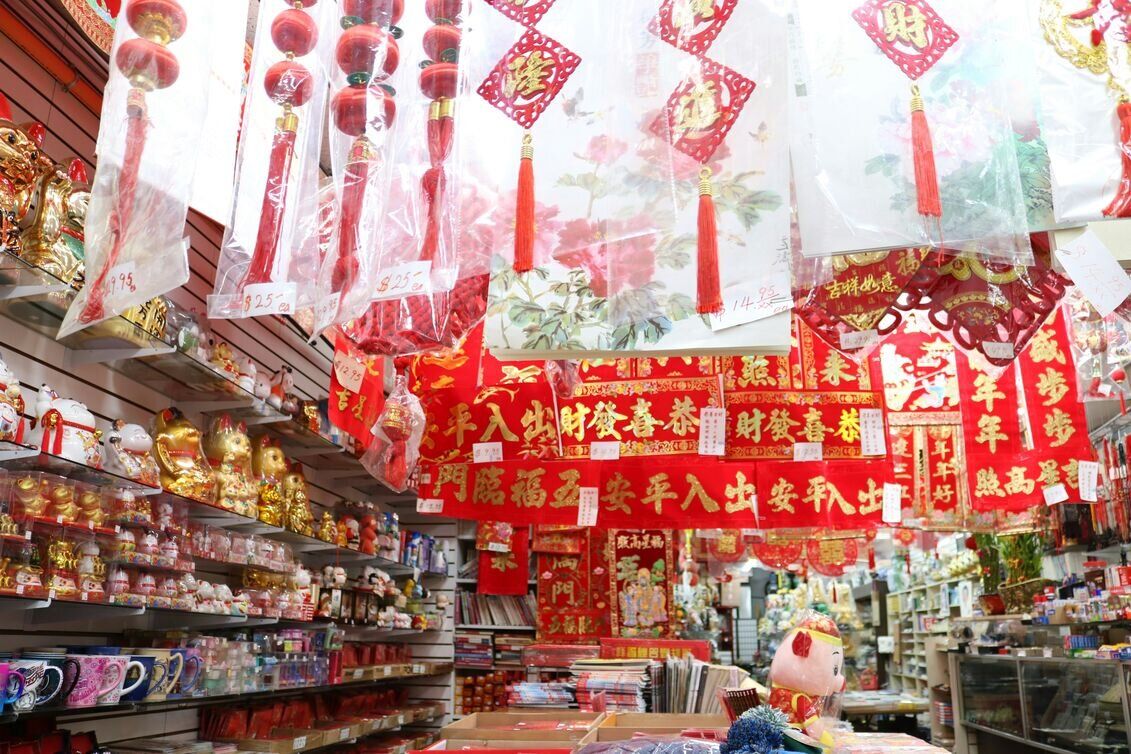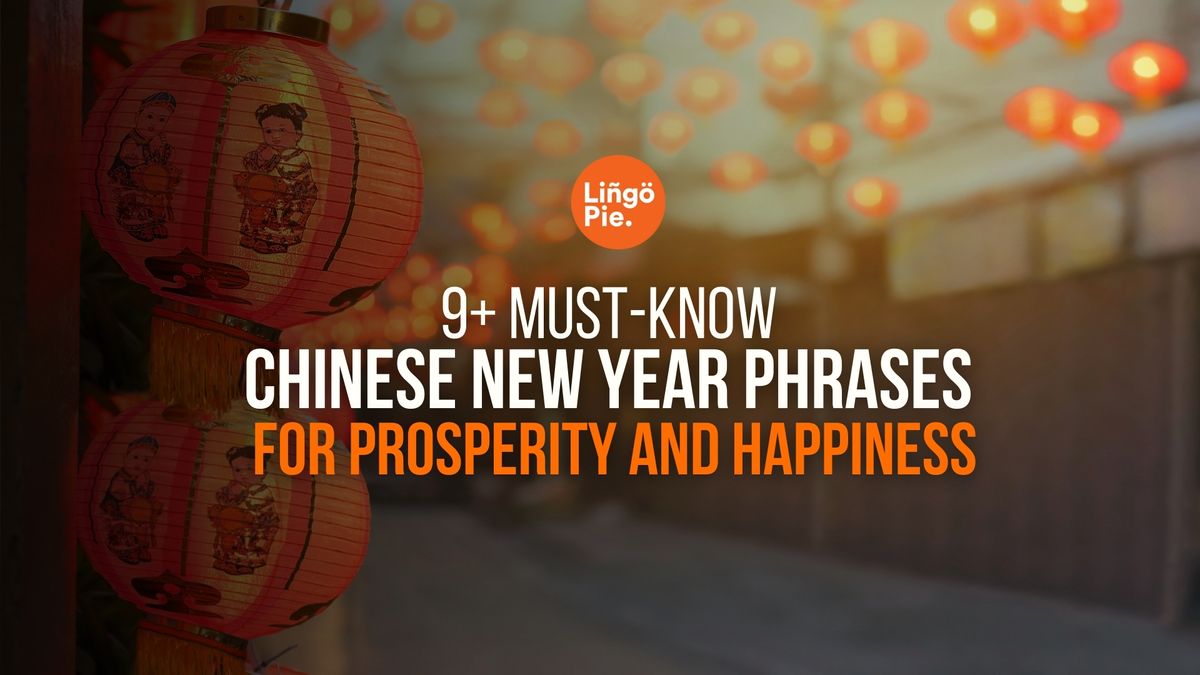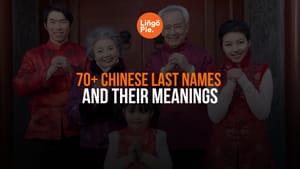You might already know how to say I love you in Chinese (我爱你 – wǒ ài nǐ), but when Chinese New Year rolls around, there’s a whole new set of phrases to master. From wishing wealth and luck to expressing health and happiness, these greetings play a big role in starting the year with good vibes.
In this guide, you’ll learn 9+ essential Chinese New Year phrases that locals actually use, plus how and when to say them. Whether you’re joining a celebration, texting a Chinese friend, or just curious about the culture, these expressions will help you sound festive and respectful from day one.
- Happy New Year in Chinese: All You Need to Know About Yuán Dàn
- 12 Zodiac Signs In Chinese: How To Talk About Your Sign
- The Best Way to Learn Chinese: Tips and Techniques for Learning Mandarin Chinese

9+ Must-Know Popular Chinese New Year Phrases
If you're looking to get into the spirit, here are some popular phrases you might hear during the holiday, along with their meanings and how to use them.
1.Xīnnián Kuàilè (新年快乐) - Happy New Year
This is the most commonly used greeting. It’s the Chinese equivalent of saying "Happy New Year!" and can be used in almost any situation. You can use this phrase to wish your friends, family, or acquaintances a joyous new year.
2.Gōngxǐ Fācái (恭喜发财) - Wishing You Wealth
This Chinese New Year greeting is probably one of the most famous and is all about prosperity. Literally, it means "congratulations and be prosperous." It's often used when you’re wishing someone success and good fortune for the year ahead. You’ll often hear this phrase, especially when people give red envelopes (which symbolize good luck and wealth).
3. Bào Zhūn Fú (报准福) - Wishing You Good Fortune
This phrase is less common but still meaningful. It’s often used to send blessings of luck and happiness. You can use it for people you care about, especially if you want to wish them all the best for the future.

Chinese New Year Wishes For Family And Friends
Chinese New Year is also a time to wish your loved ones health, happiness, and success. Here are some great phrases to express those feelings:
4. Wànshì Rúyì (万事如意) - May Everything Go As You Wish
This is a lovely, warm wish. It means "may all your wishes come true" and is often used by family members or close friends. It’s perfect for those who want to wish nothing but the best in every aspect of their life.
5. Shēntǐ Jiànkāng (身体健康) - Wishing You Good Health
Health is one of the most important things, and this phrase is perfect for family members, especially elders. It’s a meaningful way to show that you care about their well-being and wish them a long, healthy life.
6. Chúxì Yúkuài (除夕愉快) - Happy New Year's Eve
New Year’s Eve is an important time for family reunions in Chinese culture. If you want to wish someone a great start to the New Year, this is a good phrase to use. It’s especially nice for those who are spending the evening with loved ones, whether they’re celebrating at home or gathering for a special meal.
Phrases For Prosperity And Good Fortune
Chinese New Year is all about prosperity, so you’ll often hear phrases that wish people financial success or good fortune.
7. Fú Dào (福到) - Good Fortune Arrives
This phrase is used to celebrate the arrival of good luck and fortune. It’s often heard in homes and businesses as people decorate their spaces with symbols of luck, such as the character "福" (fu), which means happiness or good fortune.
8. Niánnián Yǒu Yú (年年有余) - May You Have Abundance Every Year
This phrase is linked to the idea of abundance. In Chinese culture, the word "yú" sounds like "leftover," symbolizing wealth and good fortune that remain year after year. It’s a nice way to wish someone a year full of abundance, whether that’s wealth, happiness, or opportunities.

Phrases For Luck And Happiness
Everyone loves a good dose of luck and happiness, especially at the start of a new year. Here are some common phrases to share those positive vibes:
9. Zhù Nǐ Hǎo Yùn (祝你好运) - Wish You Good Luck
Simple but meaningful, this phrase is perfect when you want to wish someone success and good luck for the future. It’s great for just about anyone—friends, coworkers, or even acquaintances you want to wish well.
How To Respond To Chinese New Year Phrases
When someone greets you with a Chinese New Year wish, it’s polite to respond with something similar to show appreciation. Here are a few responses you can use:
10. Xièxiè Nǐ! (谢谢你) - Thank You!
A simple "thank you" goes a long way. You can use this after someone wishes you good fortune or happiness.
11. Zhù Nǐ Yě Xīnnián Kuàilè! (祝你也新年快乐) - Wishing You A Happy New Year too!
This is a nice, friendly response when you want to return the good wishes.

Chinese New Year Beliefs and Superstitions
Chinese New Year is more than fireworks and red envelopes. For many families it is a time to invite fortune in and keep misfortune out, guided by customs that stretch back centuries. Below are some of the most widely observed beliefs you will notice as the holiday approaches.
Preparing the Home Before New Year’s Day
In the last days of the old year people give their houses a deep clean. The idea is to sweep out stagnant qi ― old energy ― so that good luck has room to enter. All brooms and mops are then put away before midnight because any sweeping on New Year’s Day would “sweep away” fresh fortune.
Taboos for the First Day
On the first one or two days of the new lunar year most chores pause.
- No sweeping or taking out trash, to avoid discarding wealth.
- No washing hair or clothes, because both acts symbolically “wash” prosperity down the drain.
- Scissors and knives stay in the drawer; cutting is believed to sever good luck.
Reunion Dinner and Symbolic Food
New Year’s Eve centres on the reunion dinner, the most important family meal of the year. A whole fish is served for surplus, long uncut noodles for longevity, and sweet glutinous rice cake (年糕 niángāo) for rising success in the year ahead.

Lucky Money in Red Envelopes
After the clock strikes midnight elders hand out red envelopes (红包 hóngbāo) filled with crisp bills. The packet’s colour scares off evil spirits and the money is said to protect children and usher in a prosperous start. Today many people also send digital hóngbāo through mobile apps.
Wearing Red and Avoiding Black
Red clothing, underwear, and even phone cases dominate the season because red stands for joy and wards off bad luck. Black and white are funeral colours, so they are usually avoided during visits and celebrations.
Zodiac Year Precautions
Each lunar year matches one of the twelve zodiac animals. When your own animal comes around it is called your 本命年 běnmìngnián and is thought to bring extra challenges. People counter this by wearing something red every day, often a bracelet or belt.
Learn More Chinese Phrases With Lingopie
You don’t have to be Chinese to take part in the celebration. Learning a few simple phrases like “Xīnnián kuàilè” (Happy New Year) or “Gōngxǐ fācái” (Wishing you prosperity) is a great way to join in the festive spirit and share good wishes with friends, family, and colleagues. These expressions bring people closer and help you connect with the rich traditions of this special time of year.
If you’re excited to learn more, Lingopie can help you take your Chinese skills to the next level. With fun Chinese TV shows and movies, you’ll hear these phrases in real-life conversations and pick up even more useful expressions along the way.
Why not give it a try? Start learning with Lingopie today and impress everyone with your Chinese New Year greetings!
FAQs About The Chinese New Year
The Chinese New Year is a celebration with a rich cultural significance. If you have questions about it, here are some common questions people ask.
1. When Is Chinese New Year Celebrated?
The date of Chinese New Year changes every year because it follows the lunar calendar. It usually falls between January 21 and February 20. This year, it will be on January 29.
2. How Long Does The Chinese New Year Last?
The festival lasts for 15 days, starting on New Year’s Eve and ending with the Lantern Festival. The most important celebrations happen during the first week, but many families continue celebrating throughout the entire period.
3. What Are Some Common Chinese New Year Traditions?
There are many traditions that people follow during Chinese New Year, including:
- Reunion dinners – Families gather for a big meal on New Year’s Eve.
- Giving red envelopes (hóngbāo) – Elders give money in red envelopes to children and younger family members as a symbol of good luck.
- Fireworks and firecrackers – These are used to scare away bad luck and welcome a prosperous year.
- Wearing red – Red is believed to bring good luck and ward off evil spirits.
4. What Do People Eat During Chinese New Year?
Food plays a huge role in the celebration, and many dishes have special meanings. Some popular foods include:
- Dumplings (jiǎozi) – Symbolize wealth and prosperity.
- Fish (yú) – Represents abundance and good fortune.
- Spring rolls (chūnjuǎn) – Symbolize wealth and fresh starts.
- Sweet rice balls (tāngyuán) – Represent family togetherness.
- Noodles – A symbol of longevity and long life.
5. Why Is Red Such An Important Color For Chinese New Year?
In Chinese culture, red represents good luck, happiness, and prosperity. It’s believed to ward off evil spirits and bring positive energy. That’s why you’ll see red decorations, clothing, and envelopes everywhere during the celebrations.






![Qixi Festival Guide: Meaning, Traditions, and Chinese Love Vocabulary [Guide]](/blog/content/images/size/w300/2025/06/Qixi-Festival-Guide.jpg)


